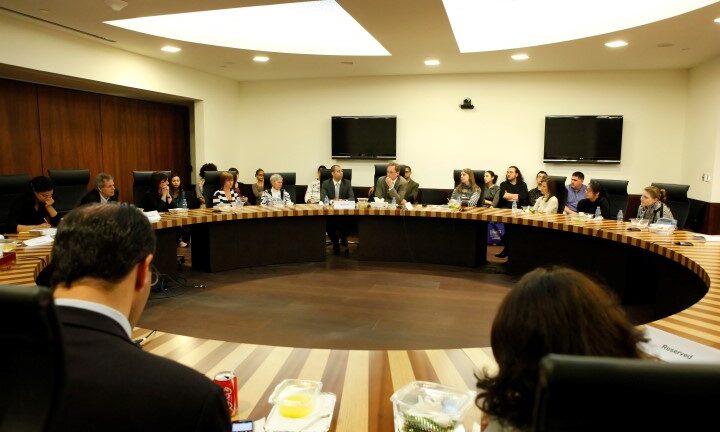American Studies, Dialogue Series, Regional Studies
Popular Uprisings in Tunisia and Egypt

Georgetown University School of Foreign Service in Qatar held an open discussion on Tuesday, February 8, 2011, to discuss the recent political upheavals in Tunisia and Egypt and their implications on the Arab world. The discussion, organized by Professor Karine Walther and the Center for International and Regional Studies, featured four experts from Georgetown’s Qatar campus.
The roundtable discussion titled, “Popular Uprisings in Tunisia and Egypt: The Jasmine Revolution and Its Aftermath,” allowed members of the Georgetown community the opportunity to ask questions and discuss the events unfolding in Tunisia and Egypt. The speakers included Abdullah Al-Arian, a doctoral candidate in Georgetown’s History department; Sharif Elmusa, Visiting Associate Professor in the Political Science department; Daniel Stoll, Senior Assistant Dean of Academic Affairs; and Mohamed Zayani, Visiting Associate Professor of Critical Theory.
The first question posed by a member of the audience related to the role played by the Egyptian constitution in the event of a government transition. Commenting on the inherent problems with using Egypt’s current constitution to foster change, Al-Arian argued that in its present form, the constitution is an ineffective document. “The way that the constitution is structured is that it puts so much power in the president’s hands that it’s basically impossible to get anything accomplished without President Hosni Mubarak,” said Al-Arian.
Elmusa echoed Al-Arian’s statement saying, “The regime has rewritten the constitution in such a way as to make it impossible for anyone else but the regime and the ruling party [NDP] to participate.”
In addressing how the constitution could prove useful, Stoll argued that the document provided a framework that could be used to implement change. “It’s a flawed document, but it’s a starting point,” said Stoll. Al-Arian agreed, adding that perhaps earlier versions of the constitution that vested less power in the Mubarak regime’s hands could be used as a “common frame of reference” to advance change.
In response to a question asking why the U.S. government had been slow to react and offer support to pro-democracy protesters in Tunisia and Egypt, Stoll answered that the Obama administration was perhaps acting cautiously. “It’s a political tightrope as to how a response is structured,” he remarked. Stoll explained that in the Egyptian case, the U.S. government was likely uncertain about whom to support since the Mubarak regime had successfully suppressed the emergence of a viable opposition leader.
Elmusa asserted that the U.S. government could perhaps do more by suspending the billions in aid it sends to the Egyptian military “without looking like they’re intervening.” In addition, he argued, this would allow the armed forces in Egypt to play a neutral role, rather than continue to act at the Mubarak regime’s behest.
Asked about the impact of the uprisings in Tunisia and Egypt, Zayani cautioned against two looming threats for the region. “One is that countries will try to preempt this rather than engage in real change.” He continued, “The other thing that happens, and there are signs starting to come out of this in Tunisia, is that real demand for real political and institutional change is being hijacked by more social demands.”
Speaking to the question of the reasons that led to pro-democracy protests in Egypt, Al-Arian responded that economic disenfranchisement due to decades of government corruption was largely at fault. “Imagine if you could get rid of all that [corruption]. So in terms of development, things can only look up,” concluded Al-Arian.
Article by Jennifer Ponard, Media Writer